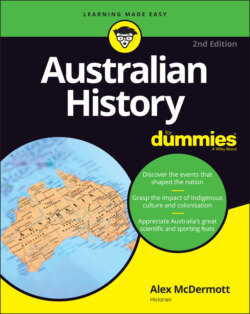Читать книгу Australian History For Dummies - Alex McDermott - Страница 60
The human material: Who were these people?
ОглавлениеThe First Fleet had arrived in NSW. So far so good. But now the hard work began. What sort of material did Captain Phillip have to work with here? Well. The human material wasn’t great, actually. While convicts arriving in early NSW were a mixed bag — including first-time offenders, ‘fall guys’, people in regular work, and those from the country and from Ireland (who were often transported for nothing much at all) — the main core of the convicts were career crims.
Most of the convicts under Phillip’s charge, and the bulk of convicts for the subsequent decades, were predominantly from urban areas, and many were from the criminal subculture. Through the 18th century, people had moved (or been moved) off the land and away from the traditional rural order, and many had drifted into the major cities. As the town populations burgeoned, so too did the criminal underworld, and among Phillip’s founding settlers were card-carrying members of it. More than half the criminals transported for the next 80 years came from cities, with nearly a third before 1819 coming from London.
Many of the convicts were literate criminals, such as forgers and embezzlers. Others were petty thieves (more than 80 per cent of convicts overall were transported for some kind of theft), burglars, horse-, cattle- and sheep-stealers (many were members of professional gangs), shoplifters, pickpockets and (the real convict royals) the occasional highwayman. Largely, the convicts were either professional thieves, living off their wits and enjoying their gains while they could, or itinerant tramps and wanderers, notoriously ‘improvident’, pugnacious, restless, big fans of egalitarianism (no differences between thieves) and with a love of independence (no bosses thanks).
In summer, these career criminals tramped around the countryside, haunting fairs, market days and race meetings, stealing chickens from gardens and sleeping under hedges. They were often drunk, and would have been prime candidates for any Gamblers Anonymous meeting. Although the line ‘honour among thieves’ was regularly trotted out, they tended to show little mutual trust, thieving from each other, dobbing each other in with the authorities after a fight or an argument, and frequently turning witness for the Crown in a trial and giving evidence against associates. If you think they probably weren’t ideal material to start a colony with, after the first couple of months Phillip would have emphatically agreed.
A negative character reference didn’t particularly distinguish the convicts from most of the other people who had accompanied them out to NSW — namely, the marines and soldiers. People sometimes make the mistake of thinking of these two groups as occupying rigidly differentiated categories. The opposite was usually the case. Today’s soldier was tomorrow’s crim: Today, you’re a soldier defending His Majesty’s best interests in a pitched battle on Bunker Hill in Boston as part of the American War of Independence; tomorrow, you’re demobbed in Portsmouth with little money and no livelihood, and happen to walk past a shop stocked with expensive linen and calicos and spy that the wares are invitingly unattended and unsupervised. Before you know it, you’re bound for Botany Bay, old son.
